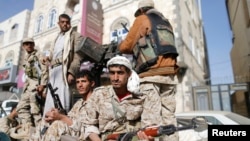The leader of Yemen's Houthis, who control Sanaa, said Tuesday that his group was seeking a peaceful transfer of power after the resignation of President Abd Rabbuh Mansour Hadi, and he urged all factions to work together to solve the crisis.
Abdel-Malek al-Houthi's conciliatory remarks in a televised speech came less than an hour after his supporters released Hadi's chief of staff, whom they seized last week in an attempt to gain leverage in a dispute with Hadi over the constitution.
The seizure of the aide, Ahmed Awad bin Mubarak, helped to plunge Yemen deeper into political crisis, resulting in clashes between the Houthis and Hadi's presidential guards that prompted the president and the government to resign Thursday.
Political parties in Yemen, including the Houthis, are currently trying to agree what to do after Hadi's resignation, which has left a power vacuum in a country that borders the world's top oil exporter, Saudi Arabia.
In his speech, Houthi warned against allowing Yemen to be pushed to collapse and said that consultations were proceeding under U.N. auspices to resolve the country's standoff.
"We are seeking a peaceful transfer of power on the basis of partnership," Houthi said in a speech broadcast on the group's al-Maseerah television. "Let everyone go toward cooperation instead of clashing, arguing and wrestling."
He added that resolutions made during nearly a year of national dialogue organized by Hadi in 2013 and an agreement signed after the Houthis captured Sanaa last September would also be the basis for any agreement.
Describing Hadi's resignation as a "maneuver," Houthi said political parties, with U.N. support, have been holding consultations to bring about a "peaceful transfer of power."
The Houthis emerged as the dominant faction in Yemen by seizing Sanaa in September and dictating terms to a humiliated Hadi, whom they held as a virtual prisoner at his home last week after clashing with his security guards.
Hadi, a former general, has blamed the Houthis' control of Sanaa for impeding his attempt to steer Yemen toward stability after years of turmoil and tribal unrest.
In a statement, U.N. special envoy Jamal Benomar welcomed Mubarak's release, saying "this news would help reduce tensions and enable progress" in the negotiations he was facilitating between political parties.
Benomar said he urged Ansarallah, the Houthis' official name, to "undertake steps that would be in the best interest of all political sides and the people of Yemen."
He also pressed all political parties to act responsibly and to give priority to the national interest, the statement said.





